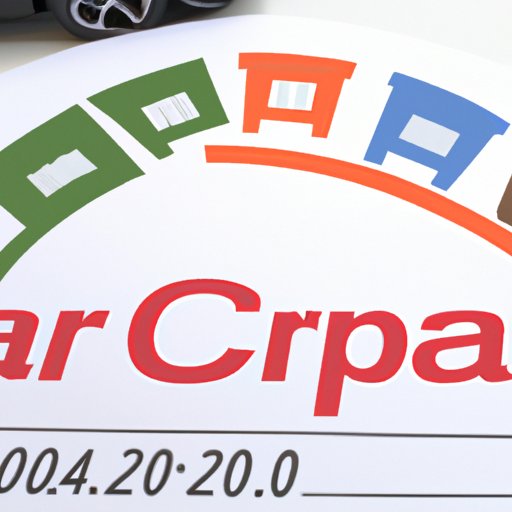Introduction
Buying a car is an important decision that requires careful consideration. Before you can purchase your dream car, you must first determine how you will finance it. The process of financing a car can be confusing, but by understanding who finances cars and exploring different sources, you can find the right loan for your needs.
This article provides an overview of who finances cars and examines the pros and cons of each option. We’ll look at different types of car loans and lenders, explore different sources for car financing, and provide tips for finding the best car loan rates. We’ll also discuss how credit scores affect car loan approval and the benefits of refinancing a car loan.

Types of Car Loans and Lenders
When you’re looking for a car loan, there are several options available. The most common type of lender is a bank or credit union. Banks and credit unions offer competitive interest rates and terms, and they often have an established relationship with the dealership. If you already have an account with a bank or credit union, they may also offer additional discounts on car loans.
Online lenders are another option for car financing. Online lenders are usually more flexible than traditional banks and credit unions and may offer better rates. However, online lenders typically require higher credit scores and may charge higher fees.
Finally, dealerships are a popular choice for car financing. Although dealerships may not offer the best interest rates, they typically offer easy-to-qualify-for loans and may have special incentives for buyers. It’s important to note that dealerships may also add extra fees to your loan, so it’s important to read all the fine print before signing any paperwork.
Exploring Different Sources for Car Financing
When you’re looking for a car loan, it’s important to compare interest rates between different lenders. Interest rates can vary significantly depending on your credit score and other factors, so it’s important to shop around for the best deals. It’s also important to understand the different types of loans available, such as fixed-rate loans, adjustable-rate loans, and balloon loans.
It’s also important to consider other factors when shopping for a car loan, such as fees and closing costs. Many lenders charge application fees and other fees, so make sure you understand all the fees associated with the loan before signing any paperwork.

Tips for Finding the Best Car Loan Rates
When you’re looking for the best car loan rates, there are a few things you can do to increase your chances of getting approved. First, it’s important to understand your credit score and what it means for your loan. Your credit score is used to determine your interest rate, so it’s important to check your credit report regularly and address any errors or discrepancies.
It’s also important to know your budget. Before you start shopping for a car loan, it’s important to calculate how much you can afford to spend on a car. This will help you narrow down your search and ensure that you don’t get in over your head financially.
Finally, it’s important to research different options. When you’re comparing car loans, it’s important to read all the fine print and ask questions. Don’t be afraid to negotiate with lenders to get the best deal possible.
Pros and Cons of Financing a Car
Financing a car has both advantages and disadvantages. One of the biggest advantages of financing a car is that you can spread out the cost of the car over time, which makes it easier to afford. Additionally, financing a car can help you build your credit if you make all your payments on time.
On the other hand, financing a car can be expensive due to interest charges. Additionally, if you default on your loan, you could lose your car. Finally, if you take out a long-term loan, you may end up paying more for the car than it’s worth due to depreciation.

Comparing Leasing vs. Buying a Car
When you’re trying to decide whether to lease or buy a car, there are a few factors to consider. Leasing a car typically involves lower monthly payments and fewer upfront costs, but you won’t own the car at the end of the lease. On the other hand, buying a car allows you to build equity and eventually own the car, but it usually involves higher monthly payments and more upfront costs.
Before you decide whether to lease or buy a car, it’s important to understand the benefits of each option. Leasing a car typically offers lower monthly payments and fewer upfront costs. Additionally, you may be able to trade in your leased car for a new one after a certain period of time. On the other hand, buying a car gives you the freedom to customize it however you want and you’ll eventually own it outright.

Understanding How Credit Scores Affect Car Loan Approval
Your credit score plays a major role in determining whether you’ll be approved for a car loan. A good credit score can help you get a lower interest rate and better terms on a loan. On the other hand, a poor credit score can make it difficult to get approved for a loan and may result in higher interest rates and less favorable terms.
It’s important to understand what a credit score is and how it affects loan approval. A credit score is a numerical representation of your creditworthiness, based on factors such as payment history, length of credit history, and amount of debt. A higher credit score generally indicates a better ability to repay a loan and may result in lower interest rates and better terms.
Examining the Benefits of Refinancing a Car Loan
Refinancing a car loan can be a great way to save money and improve your financial situation. Refinancing a car loan can lower your interest rate and monthly payments, or extend the term of the loan. Additionally, you can use a car loan refinance to consolidate multiple debts into one loan.
When considering refinancing a car loan, it’s important to understand the pros and cons. One of the biggest advantages of refinancing is the potential to lower your interest rate. Additionally, refinancing can help you pay off your loan faster and reduce your overall debt. On the other hand, refinancing may involve additional fees and may not be available if you have a low credit score.
Conclusion
Buying a car involves a lot of decisions, including how to finance it. There are several sources available for car financing, including banks and credit unions, online lenders, and dealerships. It’s important to compare interest rates and understand the different types of loans available. Additionally, it’s important to consider other factors, such as fees and closing costs.
When you’re looking for the best car loan rates, it’s important to understand your credit score and know your budget. Additionally, it’s important to research different options and don’t be afraid to negotiate with lenders. Lastly, it’s important to understand the pros and cons of financing a car and compare leasing vs buying a car.
By understanding who finances cars and exploring different sources for car financing, you can find the right loan for your needs. With the right information and research, you can solve your car financing problems and get the car of your dreams.
(Note: Is this article not meeting your expectations? Do you have knowledge or insights to share? Unlock new opportunities and expand your reach by joining our authors team. Click Registration to join us and share your expertise with our readers.)
